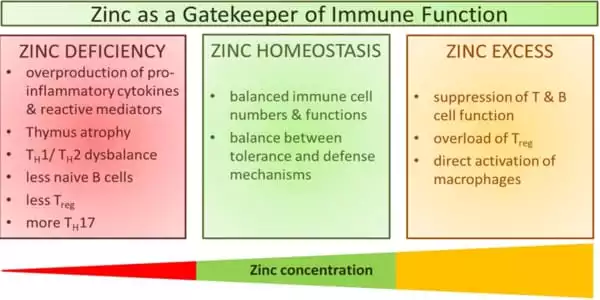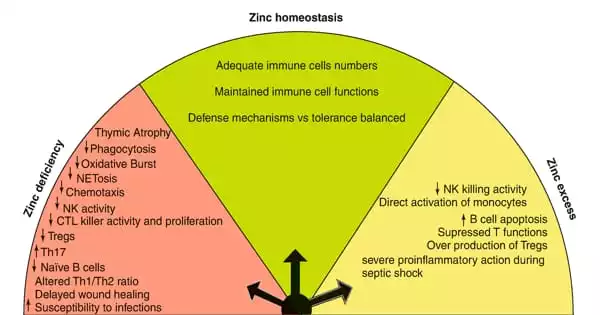Zinc’s immune-boosting benefits are well recognized, but scientists aren’t sure how it works. Scientists have discovered two ways in which the mineral boosts immunity and suggest how it could be utilized to improve health. The researchers revealed that zinc is required for the production of disease-fighting immune cells known as T cells, as well as the regeneration of the thymus, the immunological organ that generates T cells, in mice.
Fred Hutchinson Cancer Research Center scientists describe two ways the mineral enhances immunity and suggest how it could be utilized to improve health in a new study published online in the journal Blood.
“This study adds to our understanding of what zinc does in the immune system and provides a new therapeutic method for boosting immune system recovery,” said senior author Dr. Jarrod Dudakov, an immunologist at Fred Hutch. The study also discovered that an artificial chemical that mimics zinc’s function in this organ promotes immunological recovery much better than the natural mineral.
“We are now investigating how zinc might fit in with our other discoveries about how the immune system repairs itself, which could eventually lead to therapies to improve immune function for people who receive a blood stem cell transplant for a blood cancer or people who have chronic immune decline that comes with aging,” Dudakov said.
This study adds to our understanding of what zinc does in the immune system and provides a new therapeutic method for boosting immune system recovery. The study also discovered that an artificial chemical that mimics zinc’s function in this organ promotes immunological recovery much better than the natural mineral.
Dr. Jarrod Dudakov
Thymic regeneration and immune function, and zinc
Dudakov and his colleagues have previously described the molecular mechanisms and cell types that determine how the immune system’s thymus restores itself after harm. Such therapies could boost vaccination efficacy and expedite thymic regeneration following stressors such as chemotherapy, blood stem cell transplantation, and radiation exposure.
Dr. Lorenzo Iovino, the study’s first author and a research associate at Fred Hutch, joined Dudakov’s group a few years ago, and the two have been investigating zinc ever since. Dudakov and Iovino investigated how to supplement with zinc in mouse models with impaired immune systems because low zinc levels are associated to fewer infection fighting T cells and a smaller thymus, where T cells originate.
In a recent study, Iovino, a blood stem cell transplant physician, shown that zinc could promote immunological recovery in patients having stem-cell transplants for the blood malignancy multiple myeloma. However, the study did not explain why zinc was beneficial.

Zinc is critical for T-cell development and thymic regeneration
Iovino and Dudakov discovered that the thymuses of mice deprived of nutritional zinc atrophy and produce much fewer mature T cells, just as they do in people, even after only three weeks of a no-zinc diet. Iovino demonstrated that T cells cannot properly mature in the absence of zinc. He also discovered that zinc shortage impairs T-cell recovery following immune-destroying treatments similar to those given to patients awaiting a blood stem cell transplant. Extra zinc, on the other hand, accelerates this process, and T cells recover faster than usual. A mouse model of blood stem cell transplant yielded a similar result, according to the researchers.
“So we had a consistent result of greater reconstitution of the thymus as well as higher reconstitution of T cells in the peripheral circulation after zinc supplementation,” Iovino explained. “However, we still didn’t know how zinc worked.”
Iovino discovered that changes in zinc levels around cells caused the release of a critical regeneration factor, which seemed to kick-start the thymus’ renewal processes. T cells acquire zinc during development, but release it after a harmful event, such as a burst of radiation, kills them.
Cells employ a protein called GPR39 to detect changes in external zinc levels, and Iovino discovered that an experimental chemical that stimulates GPR39 to imitate rising external zinc levels could also boost renewal factor release and thymic regeneration.
“What we believe is happening is that when zinc is supplemented, it accumulates within the growing T cells. It is stored and stored and stored until the damage occurs and the zinc is liberated” According to Dudakov. “You now have more zinc than you would typically have, which can activate this regeneration process. We can target GPR39 directly with the experimental drug and get the same result without any of the pretreatment.”
Getting to the clinic
According to the experts, there is still a lot to learn before they can apply their findings to therapeutic procedures. Transplant patients already take mineral supplements, so incorporating more zinc into their treatment regimens would require ensuring that everyone receiving it is actually zinc-deficient. Iovino believes that many patients are, but there is currently no reliable test to determine this. He is presently working on one, which will first be used to assist researchers in determining if patients’ zinc level correlates with immunological recovery after blood stem cell transplant.
Dudakov plans to investigate GPR39-stimulating chemicals as therapeutics to promote thymic healing following acute damage such as pre-transplant radiotherapy. The researchers are currently evaluating similar chemicals to see whether any are more effective.
He and Iovino are also investigating whether similar chemicals could aid in thymic regeneration in other contexts. Unfortunately, as we age, our thymuses shrink and produce fewer T cells. Dudakov and Iovino also want to know if this chronic degradation may be delayed by increasing the organ’s regenerative activities.
“Our group is still piecing together the molecular factors that contribute to thymus renewal,” said Dudakov. “Our ultimate goal is to develop medicines that stimulate spontaneous regeneration and restore immunological function.”





